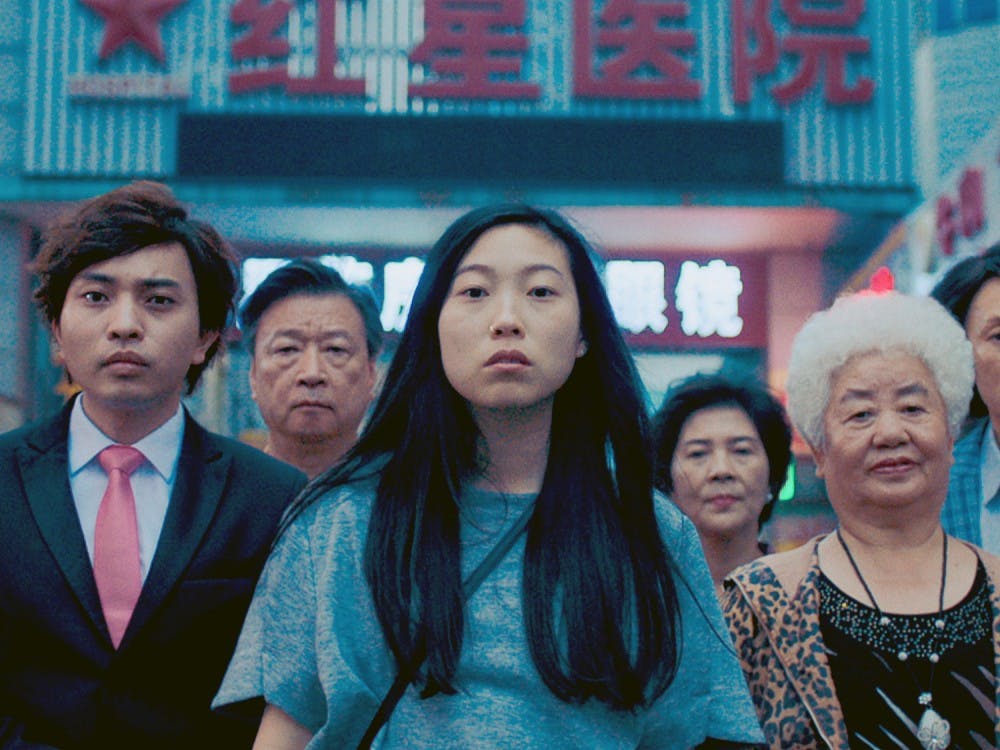It’s summer in Shanghai and the hot air clings to my skin as I say goodbye to my grandmother from the taxicab parked in front of her apartment building. The leather of the seats sticks to my thighs as she reaches through the window to grab my hand, and I see the tears well up in her eyes just as they do in mine. I am not in the habit of lying, yet I promise her that I will take her to America soon, and that she will stay with us in our home in Miami where she will spend the rest of her days. In reality, she is too old and too sick to bridge the distance between us, but I tell her that we will be together anyway to keep her heart strong and her head high. When I roll up the taxi window, my mother pretends not to see me cry as we make our way back to a place my grandmother cannot reach.
A month later, I am met with the same rush of emotion while sitting in a theater in my hometown, letting my tears flow freely as I watch “The Farewell.” It’s the story of a Chinese American granddaughter, Billi, who lies to hide the news of her grandmother’s terminal lung cancer in order to protect her grandmother from worrying about an illness she cannot control. Like me, Billi grew up in the United States and lives a life away from her nai nai, a life that is split between her Chinese roots and American upbringing, and when she returns to China to visit her grandmother, she learns about grief and identity in a way she has never experienced before.
I find it impossible to tear my eyes away from the screen, even as I ugly cry, because in all my 18 years of life, I have never seen a movie like this. I have never related more to the faces in the film that look exactly like mine, to the mix of Mandarin and English that I can understand, to the portrayal of Chinese family dynamics that I experience everyday. China is no stranger in this film — there are no exaggerated accents, no big fat Chinese love story, no unnecessary over-explanation of cultural practices. I know this China; it mirrors my own home in Shanghai, where family is more than just blood, where food is the love language that connects the young and old at the dinner table, where happiness comes from just being together.
I see so many parts of myself and my family in this movie, especially in Billi’s relationship with her grandmother. Nai nai’s insistence for Billi to eat more, her utter confidence in herbal supplements and even the shouts of “Ha! Ha!” during her morning exercises make me think of my own grandmother, who has done so many of those exact same things.
Like Billi’s father in the movie, my mother moved to America for more educational and occupational opportunities and ended up staying there, thousands of miles away from her family. As a result, I was born and raised in the United States, but I go back to China every other summer to see my grandmother, and when I do, we never fail to bond over cooking and sewing and outdoor exercises, living together as though I was never away.
My grandfather died, and my grandmother has been living alone in her apartment with hopes of joining us in America. Because she is almost 90 years old and has severe dementia, there is almost no way she can make the 24-hour journey over; however, we tell her that she can anyway because it is our job as a family to take on her emotional burden and worries as our own. “The Farewell” perfectly expresses my guilt of keeping the truth from my grandmother as Billi struggles through grief and remorse from lying to her grandmother about her terminal illness. The movie focuses on the group mentality of Chinese culture that fixates on the happiness of family and community as a whole, rather than the individual, and in this way, the film also displays the dichotomy between Western individualism and Eastern collectivism, examining Chinese biculturalism like never before.
“The Farewell” is a poignant and accurate depiction of a separated family reuniting for its beloved matriarch in a time of need. It resonates deeply with my own experiences as a Chinese American woman and someone who lives between two worlds. The relationships between me and my family are reflected onscreen, and the bond I have with my grandmother is strengthened through understanding. Although I won’t see my grandmother again for a while, “The Farewell” has made me realize that our separation is less like a “farewell” and more like a “until we meet again.”
Campus Voices is a Recess column wherein writers of historically marginalized backgrounds are invited to discuss the relationship between their identity (or an aspect of it) and a specific work of art that is meaningful to them. If you'd like to write a piece for this column, please contact Recess' editor, Nina Wilder, at nina.wilder@duke.edu.
Get The Chronicle straight to your inbox
Signup for our weekly newsletter. Cancel at any time.

